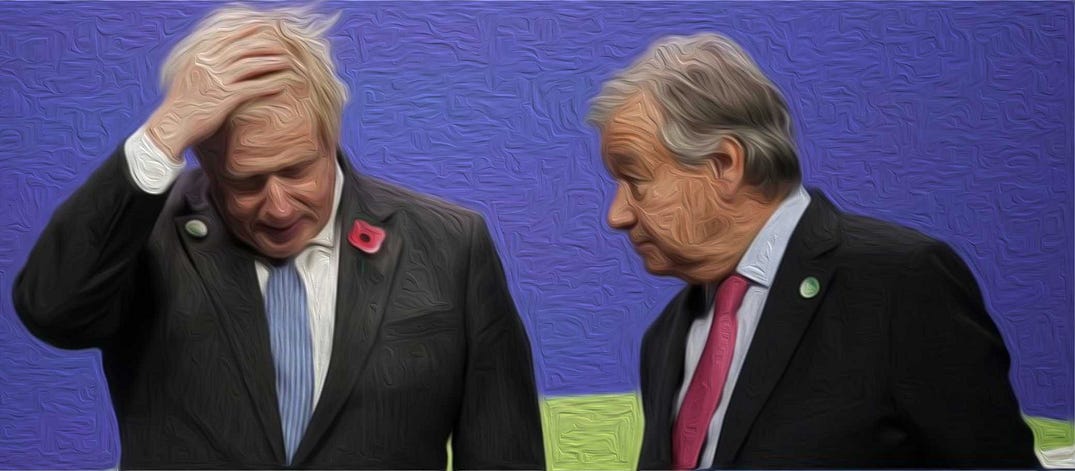The Great Pause Week 86: Planet of the Stressed
"If the response to Covid pandemic rules are a prelude, what happens when the rulebook for decarbonization arrives?"
One common refrain at COP26 in Glasgow this week is that Scottish people are the friendliest in the world. That will stand them in good stead. We cannot precisely predict climate change or its timing, but we know already that it is not entirely about the weather.
Some years ago I invited Nicole Foss to join the team as a guest teacher on our annual permaculture design course at the Maya Mountain Research Farm in Belize. I had known Nicole for a number of years as a contributor to the Oil Drum, later co-publisher of The Automatic Earth, and as a brilliant presenter of complex topics at various public forums. One of the subjects Nicole introduced to the biophysical economics discussion globally was the phenomenon of mob behavior in the Age of Limits. It is a chaos multiplier.
In earlier times, when societies were more agrarian, they were well attuned to unpredictable cycles of weather. Even as recently as the Dust Bowl of the 1930s or the Second World War, a majority of people in Western societies were acquainted with large scale disasters and what it meant to tighten one’s belt and conserve resources, especially energy, through the rough patches that came with wars, depressions, and natural calamities. They knew to ration themselves, find productive activities that are appropriate for that moment, join together in common cause, and plan for what they would do when good times returned.
Most of those living in the overdeveloped districts today no longer have that muscle memory. Entire multigenerational families have not had to experience real hardship for some time. This extended period of comfort has atrophied social skills that could be painful to rebuild.
Perils the future holds for peoples in different regions might include:
- vector borne epidemics (from changing ranges of ticks, mosquitoes, bats);
- zoonotic viruses and bacteria (from habitat destruction);
- droughts and wildfires;
- superstorms and flooding;
- expansions of corridors for ice-storms, tornadoes and hurricanes;
- new record extremes of heating and freezing;
- sea- and estuary-level rises;
- food shortages from crop failure, disease and pestilence;
- governance collapses from internal and external pressures.
Lately airlines have been reporting a sharp rise in the number of passenger discipline problems. An American Airlines flight from New York to California was diverted to Denver after a passenger punched a flight attendant who told him he could not use the bathroom while the seat belt sign was lit. In 2019, FAA reported only 146 investigations. In the first three quarters of this year, airline crews have reported 4,385 incidents of unruly passenger behavior to the FAA, with nearly three out of four of them involving physical encounters while in the air. A Flight Attendants Union survey from this summer found that 85% of 5,000 flight attendants surveyed said they dealt with unruly passengers, with about 20% also saying they’ve dealt with a physical incident this year. In October an American Airlines flight attendant was admitted to the hospital with broken bones after a passenger she bumped into got up and punched her in the face.
One incident he described involved a group of women who tried to help themselves to liquor locked up in the airplane galley and got physical with another flight attendant who told them to take their seats.
Foraging honeybees infected with mites drop their food off at the door and don’t go into the center of the hive where they might infect others. Some humans, however, see it as their right to ignore rules about masks and social distancing and they become quite irate and pugnacious if told they are being irresponsible.
If the Covid pandemic rules are a prelude, hinting how emotionally fragile some human populations are becoming, what happens when the Paris Agreement Article Six rulebook for decarbonization arrives? If we are unable to cope with minor restrictions understood to be temporary — a couple of years of a zoonotic virus — how then shall we emotionally handle much more serious restrictions — less pets, less fish, less plastics, limited travel, restrictive diets, close-at-hand storm shelters, mass relocations — potentially graduating in severity for decades and even centuries?
Abrahm Lustgarten, environmental reporter for ProPublica, commented on how paltry the trillions proposed by the Biden Administration were compared to the trillions per year in climate economic damages predicted by mid-century. He wrote:
The nation is venturing into an era where the siloed definitions of programs — infrastructure versus social welfare versus health care — no longer match the blended nature of the threat. Economic policy is no longer distinct from environmental policy, because, for example, creating high-paying jobs in Texas isn’t worth much if it’s too hot to work.
The 50 MAGAdiots and one rogue Senator from a coal state who rejected the Biden price tag for transition to industries better suited to the coming century have a new form of mental illness made up of equal parts myopia and delusion. How then shall we think of a nation — or the world — with a collective mental illness that rejects all reasonable measures to prepare for a very different future, a future now assured, a future accelerating its portents of wickedness?
Soon after we taught together in Belize, Nicole Foss relocated to New Zealand. There she experienced the much more rational leadership of Jacinda Ardern. That kind of leadership underscores another point Foss made in her talks, which is that just as there are destabilizing factors in periods of stress and social unrest, there are also restabilizing factors. There are sane and stable leaders, ways towards food and shelter security (permaculture), and an ethos of caring for others.
Societies have choices of which side to take in planning their futures. We will not likely have to wait long to see which way our own goes.
In the Glasgow climate summit this week there is a small delegation from the Pocket Project in Germany. Founded by eco-psychologist Thomas Hübl, Pocket Project helps to address and integrate individual, ancestral and collective trauma. By understanding collective wounds from the past, the Project attempts to mend the conversation in the present, “thus shifting humanity towards a path of creativity, effective collaboration and innovation.” They will be in the Green Zone from from November 1–12 for conversations, interviews, witnessing and shared meditation. Those who can join them may be able to improve their own skills in coping with what is surely coming.
You can join COP26 events live at the Glasgow Science Centre by applying for the free tickets or by joining online — Plenaries will be broadcast live and archived at UN web tv. Green Zone side events will be streamed and archived on the COP26 YouTube channel.
There will be more than 200 side events hosted, involving 300 organizations of young people, indigenous leaders, science and academic groups, businesses and grassroots networks. These sometimes include cultural performances, exhibitions, talks, film screenings and technical demonstrations to a global audience.
As the world confronts the pandemic and emerges into recovery, there is growing recognition that the recovery must be a pathway to a new carbon economy, one that goes beyond zero emissions and runs the industrial carbon cycle backwards — taking CO2 from the atmosphere and ocean, turning it into coal and oil, and burying it in the ground. The triple bottom line of this new economy is antifragility, regeneration, and resilience.
Help me get my blog posted every week. All Patreon donations and Blogger subscriptions are needed and welcomed. You are how we make this happen. Your contributions are being made to Global Village Institute, a tax-deductible 501(c)(3) charity. PowerUp! donors on Patreon get an autographed book off each first press run. Please help if you can.
#RestorationGeneration
“There are the good tipping points, the tipping points in public consciousness when it comes to addressing this crisis, and I think we are very close to that.”
— Climate Scientist Michael Mann, January 13, 2021.
Want to help make a difference while you shop in the Amazon app, at no extra cost to you? Simply follow the instructions below to select “Global Village Institute” as your charity and activate AmazonSmile in the app. They’ll donate a portion of your eligible purchases to us.
How it works:
1. Open the Amazon app on your phone
2. Select the main menu (=) & tap on “AmazonSmile” within Programs & Features
3. Select “Global Village Institute” as your charity
4. Follow the on-screen instructions to activate AmazonSmile in the mobile app.
Collective Healing in Action — PP @ COP 26
During this year’s UN Climate Change Conference in Glasgow, the Pocket Project will be exploring the connections between collective trauma and climate change. We will be hosting events to reflect on how the trauma symptoms of numbness, apathy, hyper-activation, and polarization slow down our ability to respond. Our lack of embodied relationship to the crisis is part of the crisis.
Join the community to witness, reflect and relate to what is happening at COP26:
- Daily live snippets of news and short interviews with key players at COP26
- Online live conversations with Thomas Hübl, Charles Eisenstein, Nora Bateson, Sabine Lichtenfels, John D. Liu, Karen O’Brien and others
- Participate in ‘Global Social Witnessing’ — a collective practice of relating to Climate Change with embodied awareness
- Meditation and prayer in support of good outcomes of COP 26
Facebook Livestream: https://www.facebook.com/thepocketproject
Website: https://pocketproject.org/cop-26
#cop26Glasgow #cop26 #traumainformed #traumaintegration #traumaintegration #climate #collectivehealing #onlineconference #trauma #traumahealing #betterworldforall #indigenous #collectivetrauma #buildingresilience #communitybuilding #witnessing #leadership #integration #pocketproject #socialjustice #climatejustice #SDGs




Comments